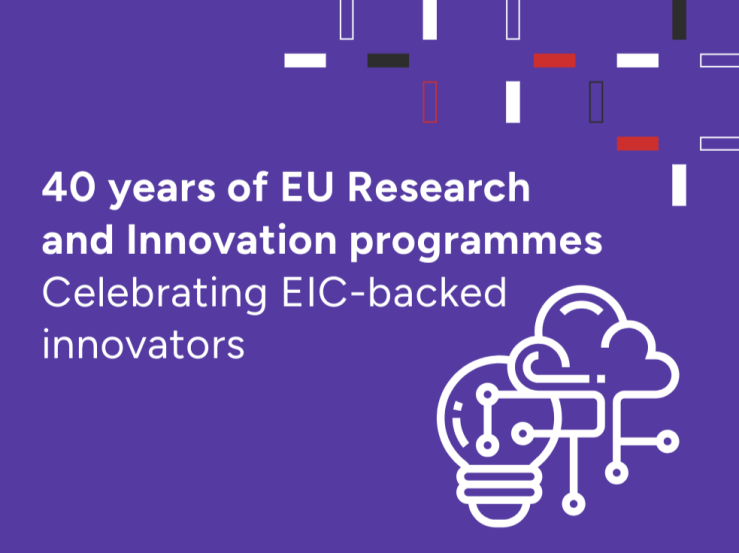40 years have gone by since the launch of the EU’s first R&I funding programme. Since its establishment under the EU Horizon Europe programme and with its €10.1 billion budget, the EIC is proud to have contributed to support its beneficiaries and their pioneering projects, laying the foundation for groundbreaking advancements in the research and innovation landscape.
To celebrate this milestone, we are warmly inviting any beneficiary with a story about the impact of EU-funded research to share it on social media using the campaign hashtags #EU40YearsRI and #ResearchImpactEU.
In light of #EU40YearsRI, we are spotlighting several EIC-funded innovators who are leveraging deep-tech to deliver forward-looking, sustainable solutions in the environmental, transportation, food industry and quantum computing fields.
Despite the different fields of action, the HIVEOPOLIS project, under the FET Proactive programme (now EIC Pathfinder scheme), the Dronamics project, under EIC Accelerator Open, the InOvotive project and the blended finance project, FRESNEL – both under EIC Accelerator pilot (previously known as SME Instrument) – well exemplify how EIC-funded projects are supporting the necessity of bringing Europe at the forefront of the green and digital transition.
Smart solutions for enhanced accessibility and ecological responsibility
EIC-funded researchers from the HIVEOPOLIS project, coordinated by the University of Graz, Austria, have made significant strides in addressing the global decline of honeybee populations through innovative technologies and multidisciplinary research. One of the standout achievements of this project is the development of 3D-printed beehives made from fungi, a natural, environmentally friendly material. Besides establishing these technologies in and around honeybee colonies to help bees cope with adverse environmental factors, the project encourages sustainability from the intellectual point of view through open software, hardware and data that will be accessible not only to beekeepers, but also environmentalists and citizens.
Traditionally dominated by container ships, cargo planes and huge trucks, the EIC-funded Dronamics project – coordinated by Bulgarian startup DRONAMICS LTD – has developed cargo state-of-the-art drones which are opening up opportunities to redefine the future of logistics through cost-effective and eco-friendly same-day deliveries. According to the innovators who developed the novel drones, the latter are up to 90% more affordable to produce and operate compared to traditional cargo transport methods and could contribute to a significant reduction in CO2 emissions by up to 60%. Additionally, requiring only 400 meters of runway for takeoff and landing, the innovative drone service is set to enhance accessibility to remote or previously underserved communities.
The revolutionary egg farming technology of InOvotive – EIC-backed project of a spinoff from the University of Leiden, Netherlands – addresses two-long-standing concerns in the poultry sector: facilitating the transition towards a more humane and sustainable poultry industry. The solution is based on a single biomarker, identified in 2016, that permits fast and accurate determination of the sex of an egg. This early detection, taking place during egg incubation has the potential not only to eliminate the need for manual post-hatching sexing but also to significantly reduce the industry’s carbon footprint. Besides developing the latter technology, the project also relies on its network for the mobilisation of relevant stakeholders and for ensuring a fast market adoption of the innovative solution developed.
Building on the unique technical capabilities of its scientists, researchers and engineers, Pasqal – spin-out from the Institut d’Optique in Palaiseau, France, and coordinator of the EIC-funded project FRESNEL – is driven by the mission of making the quantum computing world and its complex problems more accessible to businesses and customers worldwide. A major achievement of the project has been the development of the first large-scale neutral atom quantum processing units (QPUs), the most promising approach for building commercial-grade quantum computers since neutral atom platforms are intrinsically scalable. Additionally, these quantum computing technologies do not require expensive dilution refrigerators, enhancing affordability for a wider range of businesses.
Future applications of the four EIC-funded projects
Looking ahead, HIVEOPOLIS seeks to integrate honeybee societies into smart cities, creating a future where pollinators are not only protected, but play an active role in shaping sustainable urban environments. By bridging the gap between nature and technology, the project aspires to ensure the long-term survival of honeybees and the ecosystems they support.
Becoming Europe’s first fully licensed cargo drone airline in 2023 and successfully completing its first flight in May the same year, the Dronamics project is already partnering with DHL and Hellman to create a new market for drone-based middle-mile delivery.
Since 2017, inOvotive has been developing its current Alpha prototype, realising a throughput of 1,800 eggs per hour with 95% accuracy. The project’s next steps will consist in scaling the latter prototype to realise the required throughput defined by the sector, placing their machine – currently operating in line in a commercial hatchery in the Netherlands – on the path to greater commercialisation.
Aiming to provide enterprises with unprecedented simulation and optimisation capabilities, FRESNEL’s objective for 2024 is the development and industrialisation of the 300-qubits QPU series – Fresnel300. The pioneering technology and its capability to address challenging optimisation problems has already attracted the attention of leading enterprises as Électricité de France and Total SE.
Join us on a journey through 40 years of EU Research and Innovation!
Achievements in research and innovation made possible thanks to EU funding will be featured in a dedicated website and in a booklet presenting 40 symbolic stories and some of the results achieved over the last 40 years.

DISCLAIMER: This information is provided in the interest of knowledge sharing and should not be interpreted as the official view of the European Commission, or any other organisation.

